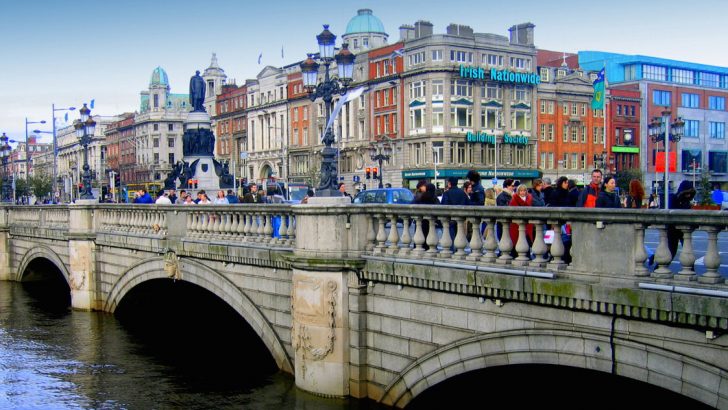You only have to walk around the centre of Dublin to see that it is a city on the edge of booming future revolution. The cranes are flying – up everywhere. The buildings in the centre of town are being renovated and restored, and the hotels are full – not just of tourists, but of bankers, investment consultants, all kinds of smart money men and women sizing up Dublin as a place to do business.
Business location consultants – people who travel around investigating the conditions for business and investment – are saying that Dublin’s future is looking terrific.
My prediction for the future is that the capital of Ireland will be, within about 10 years, almost unrecognisable. The population will double, perhaps treble.
If Brexit is bad for some aspects of the Irish economy – it is already hitting exporters, particularly in the agricultural section – it is a fantastic opportunity for Dublin. Paris and Frankfurt are both pitching to grab business from the City of London – which will in future have the disadvantages of being outside of the single European market – and it’s reported that Paris is even handing out bribes (‘financial incentives’) to bankers and brokers.
But Dublin has many advantages over Paris and Frankfurt: it’s English-speaking, it’s relatively crime-free (despite the appalling incidents of homicides that occur, statistically, violent crime is low), it is free from terrorism, and the general quality of life is attractive.
Shouldn’t any Dubliner be delighted that our native city is enjoying such a beguiling reputation?
Yes, positive news is always welcome. And yet, I also predict, there will be a real downside – some of which we are already seeing. The pressure on housing will become intense. Rented property will rise astronomically – all those financial experts who earn big bucks will send up the price. There will be much more inequality, as rural Ireland will fall behind the zooming development of Dublin.
More social inequality will probably lead to more political divisions, too. More people will vote for hard-Left candidates and parties.
Different country
The Dublin in which I grew up will be gone, and the Ireland that so many of us knew will be a different country.
Instead of lamenting and self-blaming about failings in the past – including the failings of Catholic Ireland – our moral leaders and pastors should focus on the challenges of the future. And curate the best of our heritage, too, so that those who dwell in Ireland in the coming times can remember the way it was, and many of the sweet and kind elements of old Ireland.
***
Children are born with personalities
Little Prince George, son of Kate and William, seemed unwilling to walk nicely down the red carpet laid out for him in Poland on Monday. Oh-oh! Trouble ahead! George showed all the expressions of an obstinate little person.
Can you decide on a child’s personality at the age of four? Steven Pinker, the world-renowned evolutionary psychologist, has written that personality is already formed – at birth. Babies are not “lumps of raw material,” he writes in The Blank State, “they are little people, born with personalities.”
I was thinking that George’s nanny will have to be firm with him and not allow him grow too self-willed. Yet Pinker claims that most advice on raising kids is just “flapdoodle”. The personality they are born with will frame their characters.
And yet, early experience matters deeply.
The older you get, the more you cast your mind back to those early years, and what an impact they had on the course of your life.
***
Advertisers ditching housewife stereotype
As a bad housewife myself, I suppose I should be pleased that the Advertising Standards Authority in Britain are to ban adverts which persistently show women in a housewifely role – forever cleaning, polishing, preparing meals and then washing up afterwards with wonderful Fairy Liquid.
The consumer corporation Unilever has already banned these stereotypes, which reinforce “outdated gender roles”.
As a media veteran, I’m a little more cynical as to why this step is being taken. Showing women as ditzy little housewives probably doesn’t sell the product these days – it’s rather old-fashioned now. Advertisers go with the market not with Germaine Greer (who once said: “A housewife’s work has no results. It simply has to be done again.”)
Dyson, the new-fangled vacuum cleaner (which, by the way, is a terrific gadget, as even a bad housewife can testify) sells their product with high-tech information about all the amazing stuff the yoke can do. And when Richard Dyson, the inventor who created it, promotes it himself, it’s even possible that consumers have more confidence in the man – yes, the man – who invented it. For we have to face the fact that it was men who brought us nearly all these labour-saving devices.
Tactfully, nobody ever mentions this aspect of the patriarchy in an advert!



